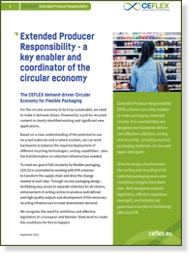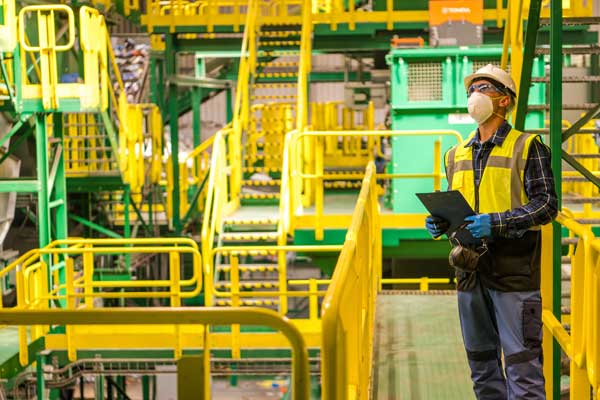EU legislation happening now will be critical in shaping Extended Producer Responsibility (EPR) for decades to come – and international best practice and progress on EPR could be undermined, with fees allocated to ‘public revenue’ rather than directly supporting required collection, sorting and recycling infrastructure.
Europe has been a leader worldwide in EPR, with many dynamic and innovative independent schemes making progress on recycling rates and circular materials. They are funded largely by fees paid by packaging producers that are invested directly back into operations. In addition to bearing responsibility for managing packaging waste, producers are set to be made responsible for meeting minimum recycling targets, with the penalty for failure being loss of market.
However, a late addition to the Packaging and Packaging Waste (PPWR) could see the legitimisation of Producer Responsibility Organisations (PROs) with no producer-mandate.
Producers with the legal obligation to meet recycling targets must be assured that PROs who collect fees for this purpose are working on their behalf and not in the interests of a third party who is not the legally obliged party.
The PPWR would endorse such PROs transferring EPR fees to the public purse with no guarantees that they would be invested into packaging separate collection, sorting and recycling infrastructure for the purposes of helping meet producers’ legal obligations on their behalf.
EPR – an enabling measure for ambitious recycling rates in Europe and worldwide
‘Producer Responsibility’ in action means that as well as paying fees, packaging producers also have a leading stake (along with other parties reflecting the circular economy) and interest in the performance of EPR – collaborating to improve design and giving technical expertise.
International best practice on governance of PROs is that they have a producer mandate and are producer-led. It is an approach which has driven progress in Europe; but also worldwide.
A leading voice in EPR development in Europe and beyond, is Joachim Quoden, Managing Director of EXPRA – the Extended Producer Responsibility Alliance. The alliance brings together 32 packaging and packaging waste recovery and recycling organizations from 30 countries, including 19 EU member states and has been working to raise awareness among decision-makers about the consequences of PROs without a producer mandate in EU legislation:

Joachim Quoden, Extended Producer Responsibility Alliance
“Why EPR has been developed? As a new economic tool to use not only the money but also the expertise of industry to move important environmental topics forward. A new approach, different from taxation where money is collected and spend by the government. Mixing the two approaches, reducing industry to a money machine is counterproductive and has proven to be not successful”.
EPR is also a central enabling theme of the UN Global Treaty to End Plastic Pollution. Major groups such as the Ellen MacArthur Foundation and World Wildlife Fund led Business Coalition for A Global Plastics Treaty advocate that “EPR systems should be established and regulated by governments, but managed by industry” and the OECD acknowledge in a typical set up, PROs are created by producers to finance their obligations in an EPR scheme and that EPR fees are not usually paid to the government because they are not a tax.
Recommendations to legislators from EPR schemes, brands and the whole value chain
Over 20 organisations from the packaging value chain – including AIM – the European Brands Association and the Extended producer Responsibility Alliance (EXPRA) and multiple different material sectors – are calling on EU legislators to delete the references to ‘State-owned Producer Responsibility Organisations’ from the text currently under negotiation.
CEFLEX joined them and strongly recommends legislators delete provisions that mention ‘state-run PROs’, PROs with ‘no represented producer’s mandate’ and EPR fees being ‘categorized as public revenue’. Similarly, there should be no option for financial guarantees in case of non-compliance with EPR obligations to take the form of a fund financed by producers’ fees and controlled by the state.
Further to this, The Producer Responsibility Organisations Packaging Alliance (PROSPA), EXPRA, the European Association of Plastics Recycling & Recovery Organisations (EPRO) and CEFLEX have raised their concerns to decision-makers in the European Parliament and Commission.
More about EPR, flexible packaging and its role in a circular economy
Extended Producer Responsibility (EPR) schemes and the Producer Responsibility Organisations (PROs) that are often used to implement them are a vital strategic and coordinating actor at the heart of the circular economy. For packaging, materials, electronic waste, batteries and more.
 They are uniquely positioned to transform the supply chain and drive the change needed at each step. This includes shaping collection, rewarding good design and ensuring sufficient sorting and recycling capacity is available to meet demand. They can also be important players in stimulating the use of recycled polymer and aligning the supply chain to produce high quality recyclates.
They are uniquely positioned to transform the supply chain and drive the change needed at each step. This includes shaping collection, rewarding good design and ensuring sufficient sorting and recycling capacity is available to meet demand. They can also be important players in stimulating the use of recycled polymer and aligning the supply chain to produce high quality recyclates.
Ensuring all materials are captured, recycled and used in a wide range of sustainable end markets – independent of cost and recycling targets – is a vital role EPR can play to help packaging materials go circular. This includes flexible packaging, a format which accounts for half of food packaging on the European market.
Working with partners across the value chain, CEFLEX developed a ‘Criteria for Circularity’ as a constructive and practical check list for all stakeholders and EPR schemes to work through on their journey to making packaging waste materials circular.
It includes a pillar on governance, outlining an evolving and inclusive governance reflecting a circular economy fully coordinated and driven by EPR with:
- It being industry led
- Consideration of financial contributions of the respective actors and representative of the fee contribution from each packaging sector
- Technical expertise within EPR schemes on consumer flexible packaging collection, sorting and recycling

 Such PROs would effectively be exempt from the EU’s harmonized minimum requirements aimed at ensuring proper governance and effectiveness of PROs.
Such PROs would effectively be exempt from the EU’s harmonized minimum requirements aimed at ensuring proper governance and effectiveness of PROs.